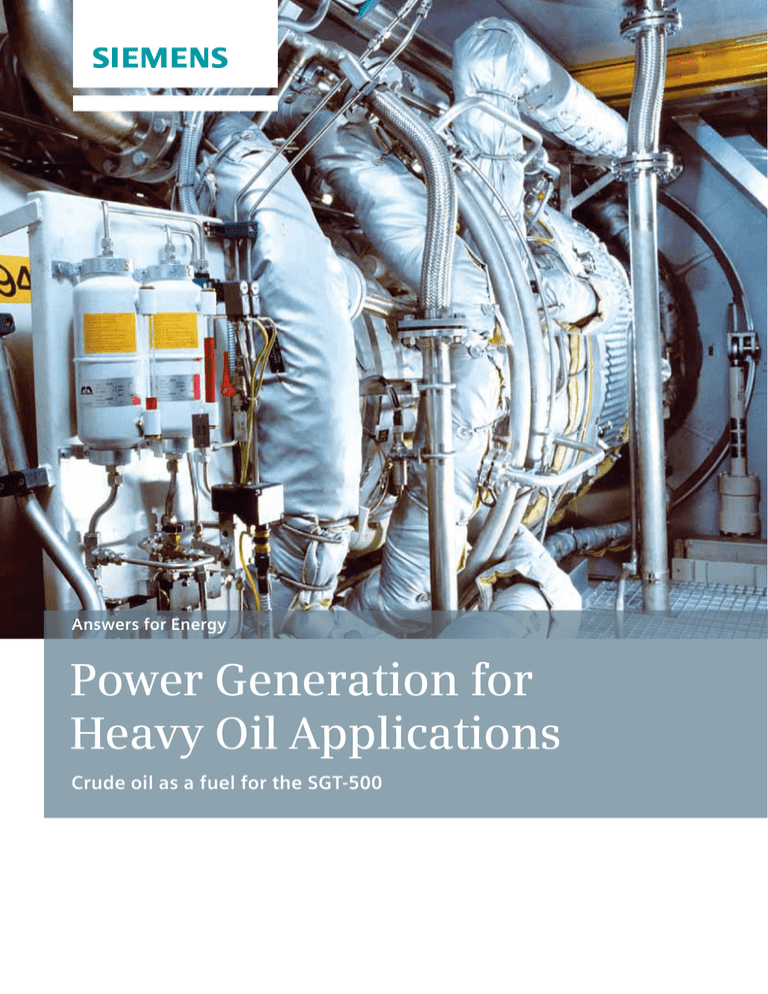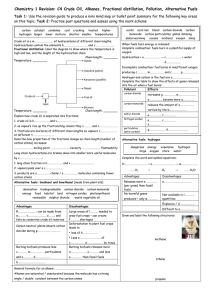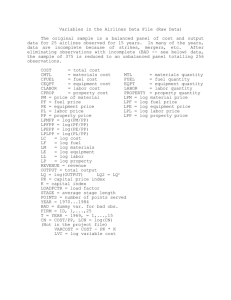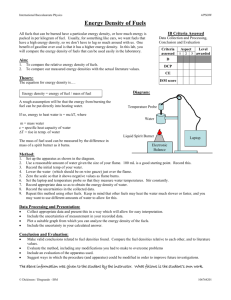
Answers for Energy
Power Generation for
Heavy Oil Applications
Crude oil as a fuel for the SGT-500
Power Generation for Heavy Oil Applications
For upstream oil operations, making use of locally ­available fuels to generate the power required is a key requirement, as facilities are often located in remote onshore
locations or offshore with no or limited access ­to an electricity grid system, and transportation of large quantities
of expensive premium fuels to the site location is problematic and uneconomic. In most instances associated
gas is used as the fuel for power generation, but in some
heavy oilfields, there is insufficient associated gas available to fuel the power plant over the lifetime of the project. Therefore it is necessary to use the crude oil ­produced
as the main fuel for power generation.
SGT-500 installations with HRSG in a cogeneration plant
the Siemens SGT-500 gas turbine to operate on crude oil
fuels, including heavy crude oil, offers a reliable, compact,
lightweight solution for power generation applications
with high availability and low environmental impact, that
also facilitates transportation and frees up deck space on
platforms and FPSOs that can then be used for processing
modules.
Two SGT-500 gas turbines powering a FPSO
Crude Oil-fuelled Power Generation
While there are several possible power generation technologies that can use a treated crude oil as a fuel, there
are often also space and weight considerations, especially
on offshore platforms, that need to be taken into account
when considering the power plant options. The ability of
Cogeneration Solutions
With high quality heat recoverable from the exhaust gas
stream, the SGT-500 also offers good cogeneration potential. The recovered heat can be used to produce steam or
hot water, or heat thermal oil, to provide the process heat
necessary for oilfield operations. This capability greatly
increases the overall energy efficiency of oil field and
refinery operations, and helps to reduce the global CO2
footprint of heavy oil production.
The SGT-500 Gas Turbine
The SGT-500 has served the oil & gas and power generation industries for over 50 years, delivering power with
outstanding operational reliability both onshore and ­offshore. While like other Siemens gas turbines offering great
fuel flexibility on both gaseous and liquid fuels, the SGT500 is unique within the Siemens portfolio in its ability to
operate on non-premium liquid fuels, including relatively
viscous fuels such as heavy fuel oil (HFO), crude oil, refinery residual oils and bio-oils. With around 500,000 operating hours experience achieved both in onshore and offshore environments on crude oil and HFO, the ­SGT-500 has
demonstrated both high reliability and high availability.
2
SGT-500 gas turbine in the workshop in Sweden
Outstanding Crude Oil Capability
The burner design is able to accept liquid fuels with
­viscosities up to 20cSt, more than twice the permissible
viscosity of most gas turbines. Combined with the pressurised fuel system that allows the fuel to be pre-heated to as high as 150°C to reduce the fuel viscosity, it is
­possible to use fuels with viscosities of 750cSt at 50°C or
higher in the SGT-500. This allows the operator to use
common heavy fuel oils such as IM380, as well as crude
oils and residual oils from refining processes, including
some medium heavy crude oils and extra heavy crude ­
oils with API gravities as low as 12° or 13°API. Where it is
necessary to comply with strict environmental regulations, water injection can be used to reduce NOX emissions. Depending on the carbon residue value of the fuel,
it is possible to achieve NOX emissions below 50 ppm
across the whole load range.
Bi-Fuelling (Mixed Fuel Operation)
Dual fuel operation – operation on 100% gas fuel or 100%
liquid fuel, with the ability to switch between fuels while
in operation – is a standard feature on Siemens gas turbines.
In instances where associated gas is present in quantities
too small to permit 100% gas fuel operation, the SGT-500
also has the ability to bi-fuel – to operate on a mixture of
both gas and liquid fuels. The minimum permissible gas
fuel flow is dependent on load, but in case of insufficient
gas fuel flow, the turbine will revert to operation on 100%
liquid fuel. This feature reduces the need to flare associated gas, or allows the gas to be used for other process
purposes, such as gas lift.
the core engine simplifies on-site maintenance, while a
core exchange can be undertaken in less than 48 hours.
The SGT-500 has an availability in excess of 97%
No matter what the fuel used, security of supply of power
is critical to upstream oil operations. The low firing ­temperature of the SGT-500 not only helps give some inherent
corrosion resistance to contaminants commonly found in
crude oil, but also helps prolong component life and hence
extended intervals between inspections and overhauls.
Compact Package Designs
In remote onshore locations and on offshore installations,
size and weight are import factors in project design, both
for transportation purposes and for allocating space in
restricted areas. The SGT-500 generator set is a compact
package design, requiring a footprint of just 20.6m by 4m,
and weighing around 205 tonnes. Modular, single-lift and
3-point mounted package designs are available to help
meet project-specific needs.
High Reliability and Availability
Operation at part-loads, with still lower firing temperatures,
also contributes to longer component life. ­Operating on
crude oil fuels at 90% of full load or less, the SGT-500 offers
high reliabilities and availabilities, with an expected
80,000 hours operation between overhauls, 10,000 hours
between inspections and, by employing core exchange
program rather than on-site maintenance, potentially ­
less than 50 days scheduled downtime in 18 years – an
availability in excess of 97%.
Maximized Production Uptimes
Like all other Siemens light industrial gas turbines, the
SGT-500 can be maintained on-site or off-site, employing a core exchange concept. The modular design of
With the features described above, the SGT-500 offers
a lightweight, compact, efficient and reliable solution
for crude oil-fuelled power generation applications
worldwide.
SGT-500 Gas Turbine
Power Generation
Mechanical Drive
Power output
19.1MW(e)
19.52MW (26,177bhp)
Electrical efficiency
33.8%
34.5%
Heat rate
10,664kJ/kWh (10,107Btu/kWh)
10,432kJ/kWh (7,373Btu/bhph)
Power turbine speed
3,600rpm
3,450rpm
Compressor pressure ratio
13:1
13:1
Exhaust gas flow
97.9kg/s (215.9lb/s)
97.9kg/s (215.9lb/s)
Exhaust temperature
369°C (697°F)
369°C (697°F)
3
Published by and copyright © 2012:
Siemens AG
Energy Sector
Freyeslebenstrasse 1
91058 Erlangen, Germany
Siemens AG
Energy Sector
Oil & Gas Division
Wolfgang-Reuter-Platz
47053 Duisburg, Germany
Siemens Energy Inc.
10730 Telge Road
Houston, Texas 77095, USA
www.siemens.com/energy
For more information, please contact
Our Customer Support Center.
Phone: +49 180 524 70 00
Fax: +49 180 524 24 71
(Charges depending on provider)
E-mail: support.energy@siemens.com
Oil & Gas Division
Order No. E50001-D430-T115-X-4A00
Printed in Germany
bdk 110301 P WS 03121.
Printed on elementary chlorine-free
bleached paper.
All rights reserved.
Trademarks mentioned in this
document are the property
of Siemens AG, its affiliates,
or their respective owners.
Subject to change without prior
notice. The information in this
document contains general
descriptions of the technical
options available, which may not
apply in all cases. The required
technical options should therefore
be specified in the contract.






